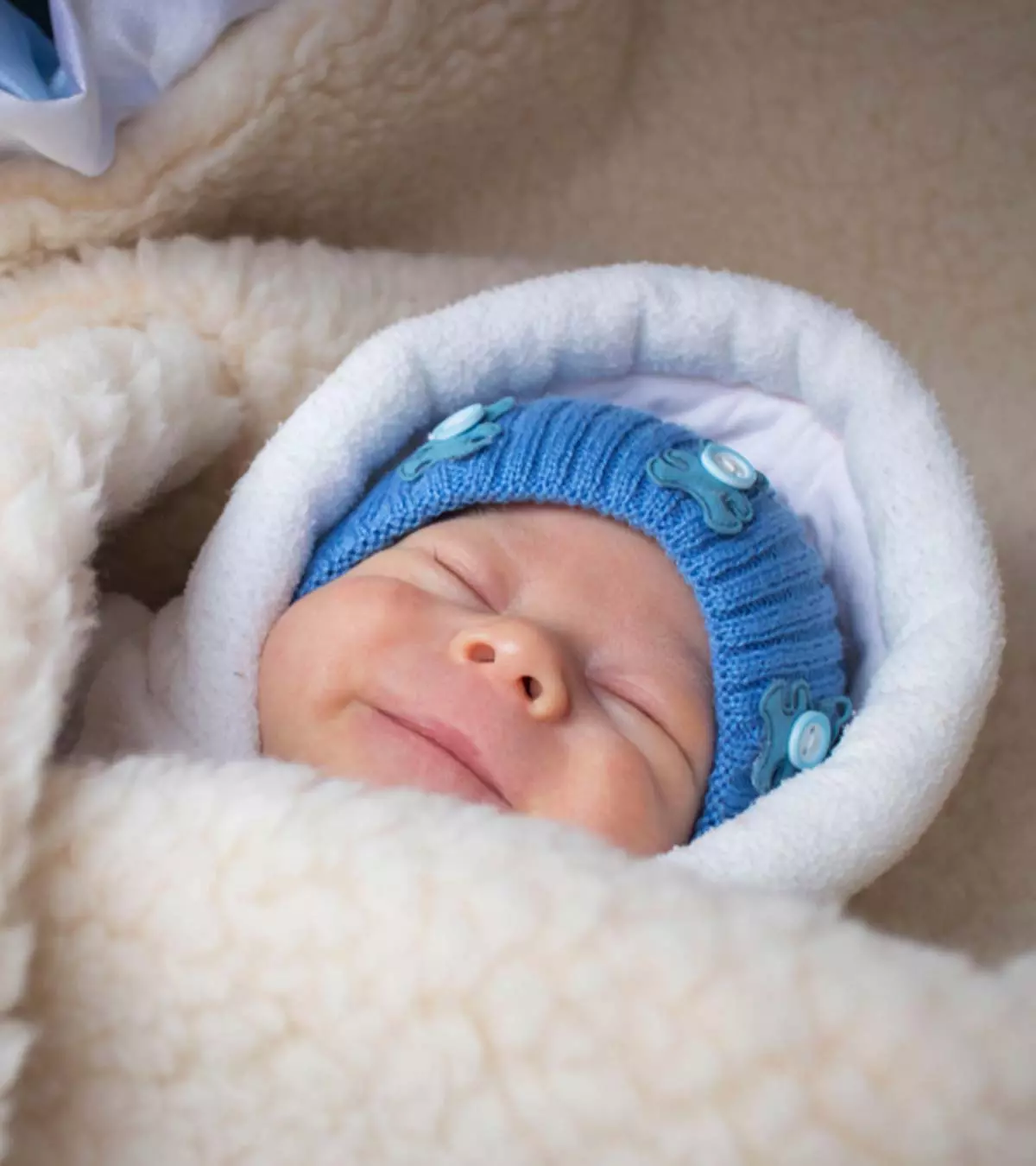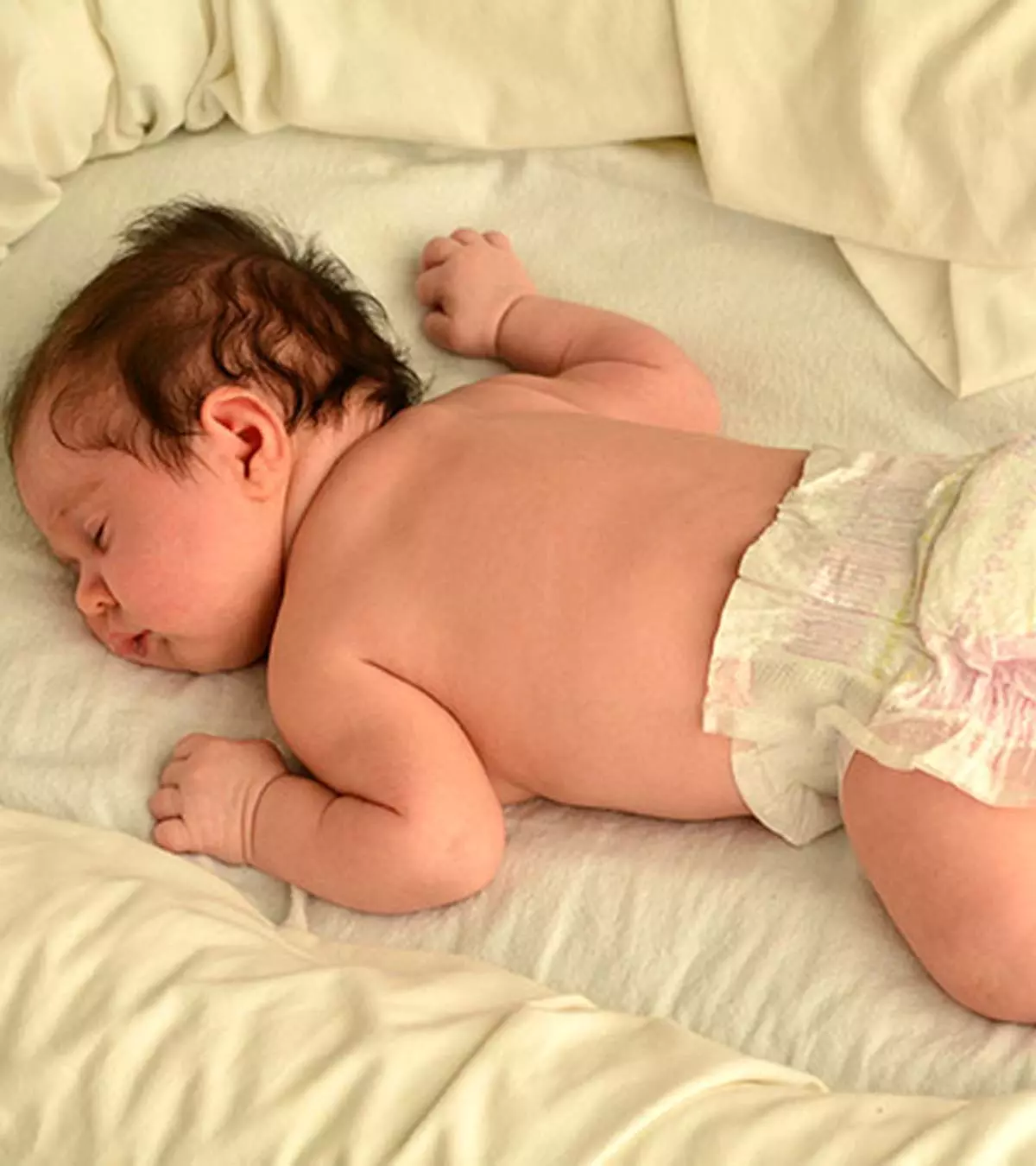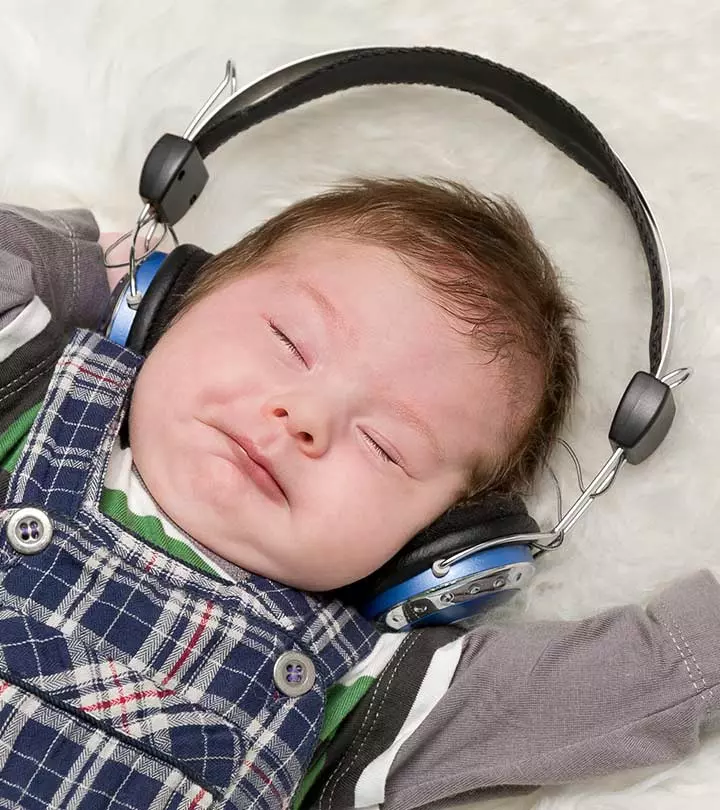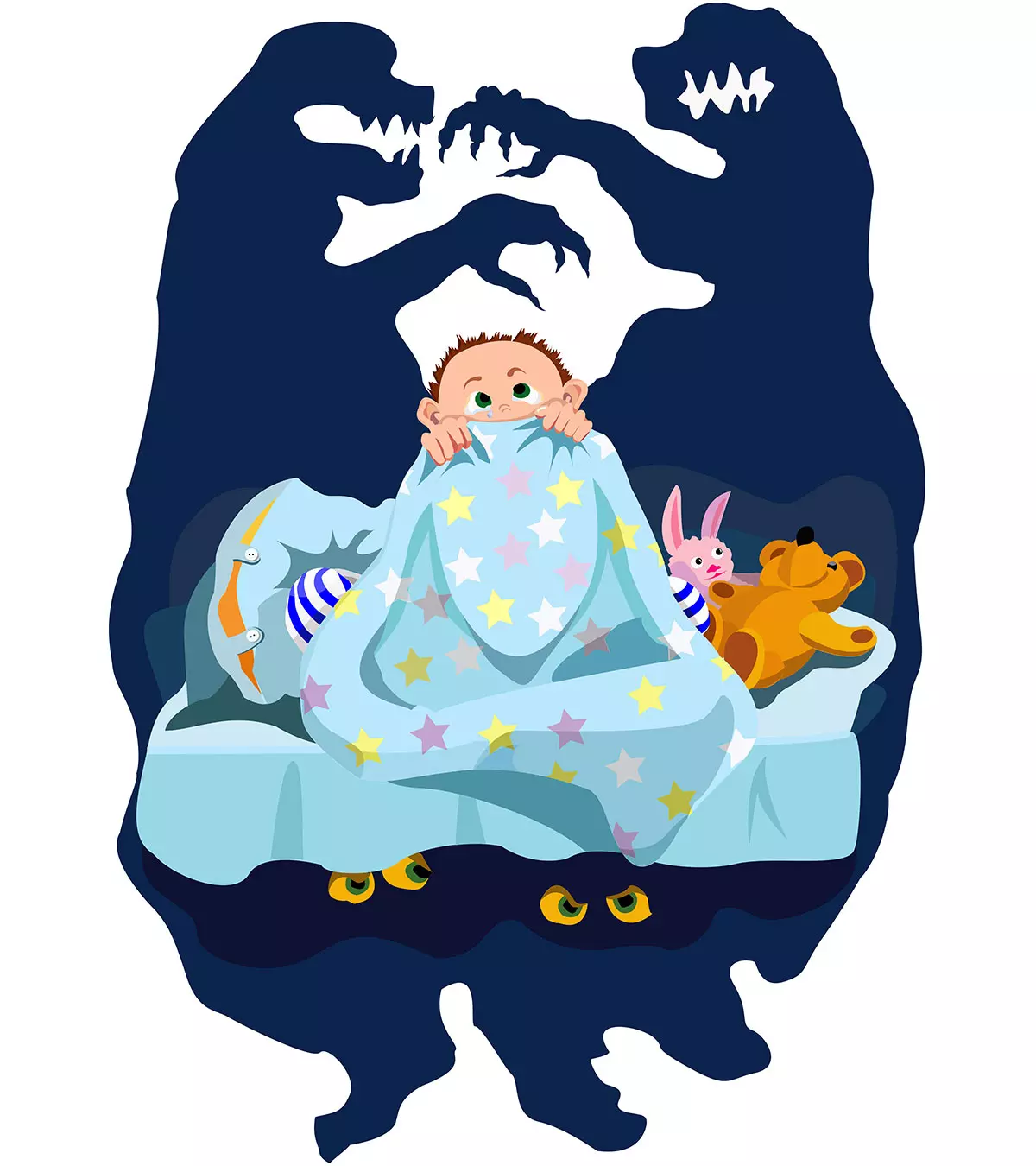
Image: Shutterstock
Nightmares and night terrors in babies are common. Sometimes, you may wake up hearing your baby’s screams and see them moving and making distressing sounds in their cradle. While they may calm down with reassuring words and your touch, they may sometimes continue to be fussy. Night terrors can be more difficult than nightmares, which you may notice from the symptoms. Nightmares and night terrors can be caused by certain changes in infant development, such as in the brain or factors such as tiredness or medications. Read on to learn more about nightmares and night terrors in babies and how to deal with them and prevent them.
Key Pointers
- Certain medications, exposure to scary events, stress while awake, and tiredness can cause nightmares in babies.
- Symptoms of nightmares in babies include waking up scared, shouting, violent limb movement, heavy breathing, and unresponsive wide-open eyes.
- It is recommended to stay calm and avoid waking the baby when dealing with a night terror to prevent injury.
- A relaxing pre-bedtime routine, familiarization with the dark environment, and using a dim light can help prevent night terrors in babies.
- Aftermaths of nightmares and night terrors in babies include fear of sleep, anxiety, excessive daytime sleepiness, lethargy, and injury.
What Are Nightmares?
Nightmares are vivid bad dreams that occur when a baby is in deep or REM (rapid eye movement) sleep (1). Children may begin experiencing nightmares as early as six months old, with a peak occurrence between three and twelve years of age (2). A nightmare is one of the main causes of toddlers waking up at night scared and nervous. Often, the baby or the toddler can remember the nightmare in detail and may even seem upset the next morning after a nightmare (3). A toddler may be able to narrate their nightmare to you in the morning, but a baby has no way to communicate it to you.
It is not known whether newborns can have nightmares. They spend more than 50% of their total sleep time in REM sleep each day (4). So, it is plausible they could experience rudimentary nightmares. There could be certain probable reasons for a little one to experience scary dreams.
Causes For Nightmares In Babies
Nightmares can be strongly linked to the events that occur during the waking hours of a baby or toddler. While nightmares are a normal part of development, understanding their causes can help in preventing and managing them effectively.
Here are some of the key reasons why they may have nightmares.
- Distressing or scary situation: A baby could be disturbed by things that may seem normal to a grown up. Your little one may experience a nightmare if he has seen or watched a scary image or has spent time with a relative that he finds creepy (5). Some other situations that are more likely to be applicable to a toddler are moving to a new place or missing a relative very badly. Toddlers with particularly good imagination may be more susceptible to nightmares after listening to scary stories (6).
- Medication: Certain medications can lead to nightmares known as medication-induced nightmares (7). In most cases, stopping the medication or a change in the dosage can provide respite.

- Stress and anxiety: Your baby may be having some fear or anxiety about something. This could manifest into a nightmare (8). However, most babies grow out of it.
- Tiredness: Acute sleep deprivation causes fatigue and tiredness, which disrupt the sleep and wake cycle in babies that may indirectly lead the brain to see negative dreams that take the shape of nightmares (9).
There are other reasons that give babies and toddlers nightmares but lack scientific evidence.
- Heavy meal before bedtime: A heavy meal right before bedtime is one of the causes of nightmares in adults (10). But it is not known if it applies to babies, although toddlers could be susceptible to this as they consume solid food.
- Gastroesophageal reflux: Acid reflux in babies, also known as gastroesophageal reflux, is uncomfortable and can cause significant distress. If the condition persists, then the baby may develop an innate fear of sleep, and have nightmares if forced to sleep. It is not known whether reflux could be a direct cause of nightmares or it is the corresponding pain associated with it that leads to nightmares.
It is important for parents to know all the symptoms so that they can spot the occurrence of a nightmare.
 Point to consider
Point to considerSymptoms Of Nightmares In Babies
Nightmares can be easy to spot since your little one is quite likely to immediately alarm you about it. Their expressions and behavior after waking can provide clear indications that they experienced a nightmare (11).
Here are more symptoms that your baby or toddler will show when he has a nightmare:
- Waking up abruptly and immediately: Your baby will wake up suddenly and call out for you. They might remember the dream quite lucidly.
- Visibly scared: Your baby will be visibly terrified as if they saw something scary right in front of their eyes. Your baby may even sweat and their heartbeat could be fast.
- Afraid of going back to sleep: The baby or toddler will be afraid to sleep again especially if they were sleeping alone or in a separate bed or crib.
How To Deal With A Nightmare?
When a baby or toddler experiences a nightmare, their response is driven by a strong emotional reaction. There are ways you can comfort your baby and ensure that they are not afraid of nightmares again (12).
- Assure, reassure, and cuddle: There is nothing more soothing to a toddler than the voice of their parents, after a nightmare. Spend ample time with your toddler, assuring them that you are around. Since babies may not understand verbal assurances, the best way to make them feel secure is by cuddling them. Hold your baby snugly close and sing a lullaby to help relax.
- Explain what happened: Once the initial anxiety has settled down, try explaining to your toddler that they just had a bad dream. Help your toddler understand that nightmares seem real but can never harm in real life.
- Change the mood: Try making the moment lighter by sharing a funny experience or a joke that your toddler can understand. Let another family member join you and have a light-hearted conversation with the toddler.
- Have a security item: Give your baby something that will make him feel comfortable and act as a symbol of security. This could be anything from a soft blanket to a simple cuddly toy.
- Wait until the baby falls asleep: Also, be sure to give him a reassuring hug before leaving.
- No nightmare talks in the morning: Do not discuss the nightmare directly. Instead, ask a question like ‘Did you sleep well?’ If your toddler starts talking about the scary dream, then listen carefully. If your toddler seems unbothered in the morning, then that is wonderful!
Nightmares can be prevented easily, and we’ll tell you how.
Preventing Nightmares
By implementing the following strategies, parents can help their babies and toddlers develop a healthier and more secure relationship with sleep, reducing the frequency of nightmares and nighttime anxieties.
- Have a relaxing pre-bedtime routine: The one or two hours before your baby’s bedtime are crucial in ensuring that he gets a peaceful sleep. During this time do not expose your baby or toddler to anything that can fuel nightmares. This includes scary or disturbing stories, films, or images. Focus on reading some funny or cute bedtime stories with bright illustrations.
- Acquaint him with the dark: Turn off the lights and acquaint him with things that he might see in the dark such as shadows and stray light from the windows. This can help mitigate the fear of the dark, which in turn will help your little one sleep better.
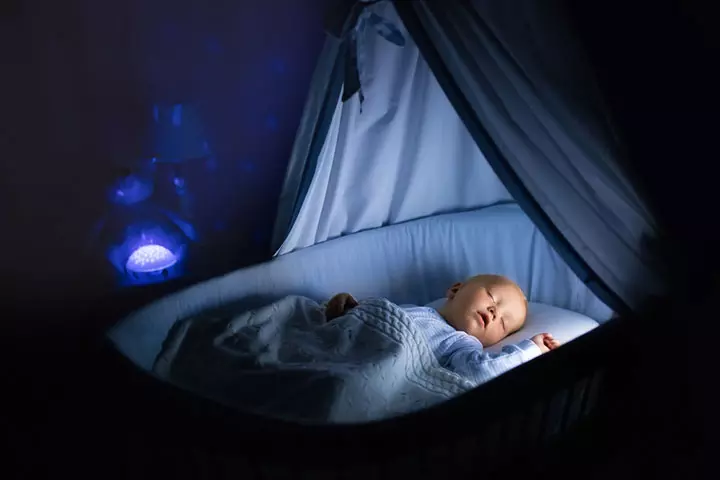
- Use a dim nightlight: Install a dim and soothing nightlight in the room, which helps him see around the room and feel confident about closing his eyes.
- Limit exposure to scary or disturbing content: Avoid allowing the child to watch frightening or intense content on TV, mobile devices, or books before bedtime (12).
Nightmares are preventable, and most toddlers eventually understand that they are just bad dreams that go away with the night. But night terrors terrorize even the parents. It is something that is equivalent to seeing a nightmare with their eyes wide awake but during a state of sleep.
What Are Night Terrors?

Night terrors or sleep terrors are episodes of partially waking up from sleep with a sense of fear that may cause the baby or toddler to scream, shout, or cry. The child may even thrash their hands and legs violently in bed and seem oblivious to the people and the environment around them. The baby’s eyes could be wide open, but they will not respond to you even if you stand right in front of them. Babies and toddlers don’t often remember night terrors, which means even if you coaxed your little one to speak about it, they might be clueless (13) (14).
Differences Between Nightmares And Night Terrors
Nightmares and night terrors are both forms of sleep disturbances in babies and toddlers, but they differ significantly. Understanding these differences can help parents respond appropriately and create a comforting sleep environment for their little ones. Here are some key differences between nightmares and night terrors (12):
- during REM sleep usually after several hours of falling asleep. Night terrors happen during Non-REM (NREM) sleep, the initial two to three hours of sleep (15).
- Nightmares happen during REM sleep usually after several hours of falling asleep. Night terrors happen during Non-REM (NREM) sleep, the initial two to three hours of sleep (8).
- Nightmares awaken the baby/toddler, and he may seek some comfort from a parent. Night terrors do not awaken the little one, and instead, he stays in a state of semi-sleep with his eyes wide open.
- A nightmare episode may last a few seconds to a few minutes, whereas night terrors can stretch up to 45 minutes.
- During a nightmare, a baby may move limbs but very gently. In a night terror, a baby may move limbs so violently that he risks rolling down from the bed or injuring himself by accidentally hitting something.
- A nightmare does not lead to sleepwalking but a night terror can cause a toddler to sleepwalk (13).
- A baby may wake up when coaxed to do so during a nightmare. A baby may not wake up at all during a night terror and even if he does he may be aggressive and disoriented.
- After a nightmare, the baby’s sleep is reset, which means he will have trouble falling into a deep sleep for some time. After a night terror, the baby will automatically fall into a state of deep sleep.
- Your baby will still remember the complete or a bit of a nightmare in the morning. There is going to be no active cognizance of night terror in the morning.
It is, thus, believed that night terrors are spontaneous events that happen when the body is transitioning from one state of sleep to another (16). While it may seem like a random event, there are some definite underlying reasons for it to happen.
Causes For Night Terrors In Babies/Toddlers
According to the National Institutes of Health, night terrors primarily impact children aged three to seven. Research indicates that roughly 30% of children go through episodes of night terrors (17). The causes of night terror overlap with that of nightmares. Following are some of the common reasons for the occurrence of nightmares and night terrors (18):
- Experiencing a distressing or scary situation
- Medication
- Stress and constant worry
- Fatigue and tiredness
Along with these, night terrors may also be caused by other reasons that basically disturb the brain’s ability to slip into deep sleep (19):
- Fever: A high fever may disrupt a baby’s sleeping pattern and interfere with the brain’s normal functions. This can cause glitches in the brain when transitioning from NREM sleep to REM sleep that eventually leads to night terrors.
- Lights or noise: If a baby is sleeping in an environment with harsh lighting and glaring sounds then his sleep may get repeatedly disturbed causing night terrors.
- Overfull bladder: This can cause sleep disturbance, triggering a night terror.
The causes for night terrors are fundamentally similar to nightmares, but the symptoms are definitely different.
Symptoms
Night terrors can be alarming to witness, as they involve intense physical and emotional reactions. Recognizing the distinct symptoms of night terrors can help caregivers manage them effectively and ensure the child’s safety during an episode. Here are some definite symptoms of a night terror (20):
- Scared facial expressions: As mentioned above, if the baby seems petrified, and is crying badly, then he is definitely having a night terror.
- Shout and scream: He will shout as if yelling at someone or simply scream in fear and distress. His tone may change through the episode.
- Moves limbs violently: He will thrash his legs and hands in the bed, aggressively, toss and turn over, and be noisy.
- Heavy breathing and sweating with rapid heartbeat: He could be drenched in sweat and have a heavy breathing. You could feel his heart pounding through his chest.
- Eyes wide open with no response: During a night terror, the baby’s eyes can be wide open, but he does not seem to be seeing anything around him. He will not respond to your words or be able to see you or anything else within the field of his vision.
- May sleepwalk: Night terrors could be associated with sleepwalking, but not all toddlers do this. As there is intense physical movement, a toddler may take a few steps and remain oblivious to his walking.
Kim K, a mom and blogger, shares how her daughter Josie’s night terrors with intense screaming affected her. She says, “She (Josie) screamed holy terror in her crib. I can’t even describe the screaming that would go on in her crib. It was like nothing I had ever heard…Before her heart surgery, she used to scream and thrash all night long…She slept for 20 minutes and then would wake up screaming. I was exhausted, frustrated, and unprepared for the sleep deprivation that came with our new daughter (i).”
Night terrors may also occur multiple times in the night. Often, the baby goes back to sleep, but you may be worried about the next episode. Night terrors can be prevented, and we will give you a few ways to do so.
How To Deal With A Night Terror?
While the episode itself can be intense, the good news is that children typically have no memory of it upon waking. Your role as a caregiver is to ensure their safety, remain calm, and manage the situation in a way that prevents further distress. Here is what you must do when the little one is having a sleep terror (12):
- Do not attempt to wake the baby: Your baby is not dreaming, but is in a transition between sleeping and keeping awake. Waking the baby up at this stage may confuse him, and he may fail to recognize you. To make matters worse, he may get aggressive and violent as his brain will be unable to interpret reality.
- Stay calm: Stay calm and make sure the baby does not fall off the bed or hurt himself through the terror. As you should not wake him up, be there only as a protector.
Gina, a mother, shares what helped in handling her son’s night terrors that started around his fifth month and happened about once or twice a week for roughly ten months. She says, “You have to let it run its course. Protect your child from falling out of bed or harming themselves accidentally, stay up with them. With as much as you want to, do not hold them tight or close to you, it will make it worse. You don’t know what your child is going through, so you have to remain as calm as possible. Make a bottle and offer it to them, sometimes they will snap out of it and wake up and calm down. Changing a diaper sometimes can make them come to. Night terrors usually last around 30 minutes. Some last shorter, some last longer. James’s would go on all flipping night—something I would not wish on my worst enemy (ii).”
- Wake the baby post the terror: Once you feel the terror has passed and the baby is calm, gently wake the baby up and assess his demeanor. If he seems a bit shaken, then you can comfort him by holding and cuddling him. You may consider breastfeeding the baby. In the case of a toddler, gently cuddle with him and ask him how he feels. Listen to what he says and make him feel secure. You could help him fall asleep.
- Do not mention the terror: In case of night terrors, your baby or toddler will not remember anything the next morning and will be his regular self, which is why it is best to avoid discussing the terror. You can still ask him questions about how he slept.
Preventing Night Terrors
Preventing night terrors is similar to preventing nightmares due to their overlapping causes. Here are some ways you could employ to prevent night terrors (12) (16):
- Have a relaxing pre-bedtime or nighttime routine
- Make sure the child does not get overtired
- Acquaint him of the things in the dark
- Use a dim nightlight
Beyond these ways, there are some additional things you can do to prevent night terrors:
- Peaceful sleeping environment: Remember, night terrors occur when the brain is trying to slip into a state of deep sleep. Any event that causes restless sleep in babies has the potential to trigger night terrors. Therefore, make it a point that the baby or toddler sleeps in a quiet and comfortable environment. Insulate windows to prevent any noise from creeping into the room. While you can use a dim nightlight, avoid using harsh lighting.
- Let the baby sleep after a visit to the toilet: The lingering urge to go to the washroom can disturb the baby’s NREM sleep, which in turn has the potential to cause night terrors. If your little one is a toddler and old enough to go to the toilet then make sure you ask him to do so before going to bed.
- Do not let the baby sleep hungry: Hunger can cause infant sleep disturbances. While this may be more common amongst adults, it applies to babies and toddlers as well.

Night terrors can be preventable just like nightmares. They occur due to the over-arousal of the toddler’s underdeveloped central nervous system, which itself could be influenced by genetics. These conditions can lead to some other problems in a baby’s life.
Aftermath Of Nightmares And Night Terrors
The baby may experience certain negative consequences of night terrors and nightmares. Here are some of the common occurrences (22):
- Fear of sleep: A baby/toddler may not like to sleep due to the fear of experiencing another nightmare (9). This is quite likely to happen when he experiences nightmares repeatedly.
- Anxiety during the day: If the feeling from a bad dream lingers then the baby will be in an anxious mood the next day.
- Excessive daytime sleepiness: Since the baby or toddler has had a disturbed sleep at night, the little one could feel sleepy throughout the day and will have more naps in the afternoon, which should be discouraged as sleeping during the night is more important.
- General lethargy: Lack of sleep makes the baby lazy all through the day. Therefore, he will show less interest in playing and interacting with others.
- Injury: In an episode of night terror the baby/toddler may move his limbs so violently that he may actually injure himself due to impact. He may fall off the bed or injure himself when he sleepwalks.
Nightmares and night terrors may also be an indicator of some underlying medical condition that could have serious repercussions. This is usually manifested by the presence of some symptoms that warrant prompt medical attention.
When To See A Doctor?
If your baby or toddler seems to have chronic bouts of nightmares and night terrors, then it could be an indicator of some major medical problem. You must keep an eye on the following situations during nightmares and night terrors (23):
- Baby or toddler jerks violently or/and stiffens during nightmares or night terrors
- The condition interrupts their regular sleep drastically
- They seem lost or/and anxious even during the day
- They have bad dreams and terrors during daytime naps as well
- Their bedtime behavior seems awkward, and you sense that it has something to do with his nightmares and night terrors
Medical Problems That May Lead To Nightmares And Night Terrors
These are some medical conditions that are generally manifested through nightmares and night terrors:
- Epilepsy: Nightmares and night terrors may occur in babies and toddlers suffering from epilepsy, as epilepsy causes neurological problems, which affect the sleep cycle (24). Babies that experience night terrors early in their life may be diagnosed with epilepsy later in life.
- Sleep apnea: Sleep apnea is the constriction of the upper respiratory airways during sleep. This sleep disorder can cause disturbed sleep that can trigger nightmares (25).
Nightmares and night terrors can be general indicators of mental health disorders or problems (1). Do note that if a baby/toddler has a nightmare or night terror, it does not mean that he has some neurological issue or is on the path of developing one. You must let a medical practitioner make the inferences.
Treatment Of Nightmares And Night Terrors
While there is no specific treatment for these conditions, a doctor will take a multi-faceted approach towards treating or managing them. Here are some of the steps taken to treat the condition:
- Managing the fundamental cause: Traumatic events or stressful experiences can all be daily triggers. Therefore, a doctor will try to understand your baby/toddler’s daily routine to discern a possible periodic event that is stressful. Once identified, parents are suggested ways of preventing exposure to the conditions that can lead to the cause.
- Therapy: The toddler can undergo counseling and relaxation therapy to help him sleep better. He may also be encouraged to socialize and play with other toddlers to keep his mind busy and distracted. Instructional sleep therapy also works, in the case of older toddlers. Here the toddler is trained to sleep properly, and the parents will be instructed to provide better sleeping conditions. A study report states, “Anticipatory awakening, performed approximately half an hour before the child is most likely to experience a sleep terror episode, is often effective for the treatment of frequently occurring sleep terrors (26).”

- Medication: If the condition is dire, then the doctor may prescribe medicines to dull the intensity of the problem (26). Babies and toddlers are too young to be given sleep-inducing medication such as sleeping pills.
- Being all ears always helps: Sometimes, the best way to treat your toddler is by listening to him keenly and regularly. Describing his scary dreams and perhaps drawing them out are his ways of releasing the fear and making him feel confident about sleeping. Do not brush it away as silly imagination or baby talk. Spend time and encourage him to share his experiences. Perhaps you can ascertain an event in the day that is probably leading to nightmares and night terrors.
Waking up from their sleep in tears and making distressed sounds while sleeping may indicate nightmares and night terrors in babies. Reassuring words or a warm touch could soothe them and help them go back to sleep. Nightmares could be caused by some events in their life, anxiety, stress, or the effects of medications. Changing their mood before putting them back to sleep is the best way to handle a baby who wakes up from nightmares. Following a relaxing bedtime routine, using dim night lamps, and ensuring they do not sleep hungry may reduce or prevent nightmares in babies.
Infographic: Symptoms Of Nightmares And Night Terrors In Babies
Having a baby awake at night suddenly, crying or screaming, is quite a common experience among parents. However, knowing if it is caused due to a nightmare or night terror can help look for effective management. The infographic below highlights symptoms of nightmares and night terror in babies to help better discern between the two.
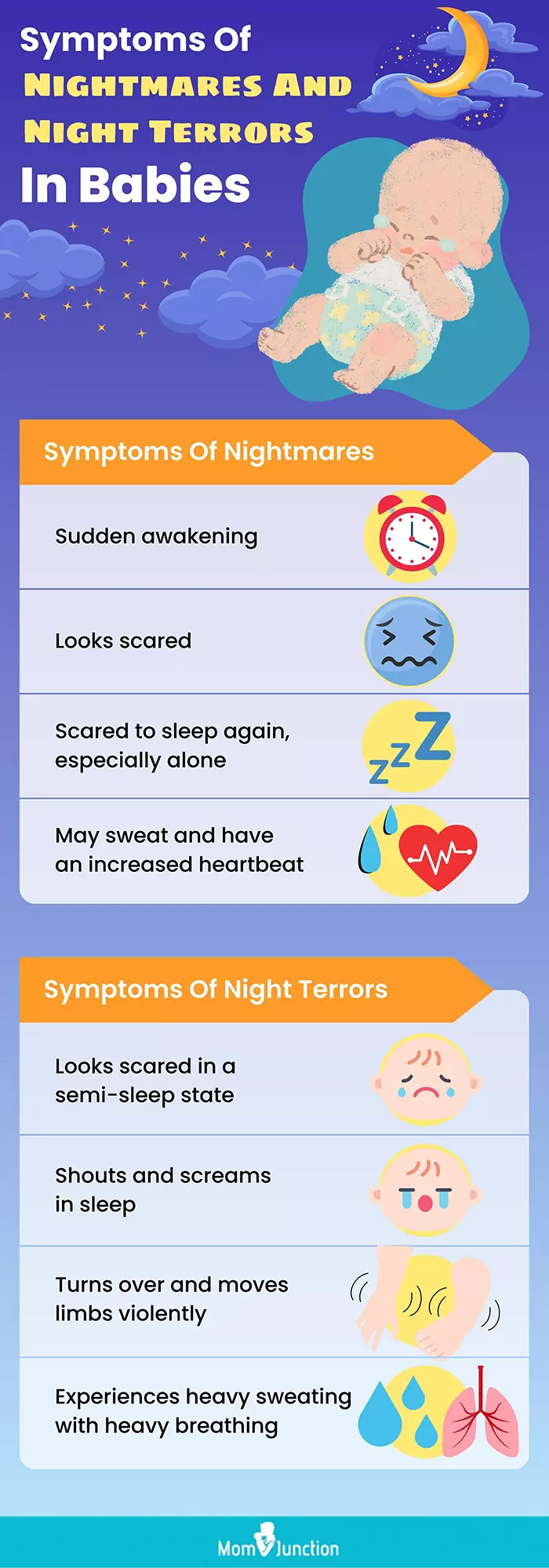
Illustration: Momjunction Design Team
Frequently Asked Questions
1. What is the difference between a bad dream and a nightmare?
Bad dreams and nightmares can lead to disturbing, scary, and stressful dreams. Nightmares disrupt sleep and cause you to wake up, whereas bad dreams don’t (1).
2. What foods cause night terrors in babies?
Although there are no specified foods causing night terrors, avoiding caffeinated or high sugar foods and beverages and chocolates before bedtime may help reduce the chances of night terrors (18).
3. Can babies get nightmares from TV?
If babies have watched scary or disturbing content on TV, it may increase their chances of getting a nightmare (27).
Illustration: Nightmares And Night Terrors In Babies: Signs And Prevention
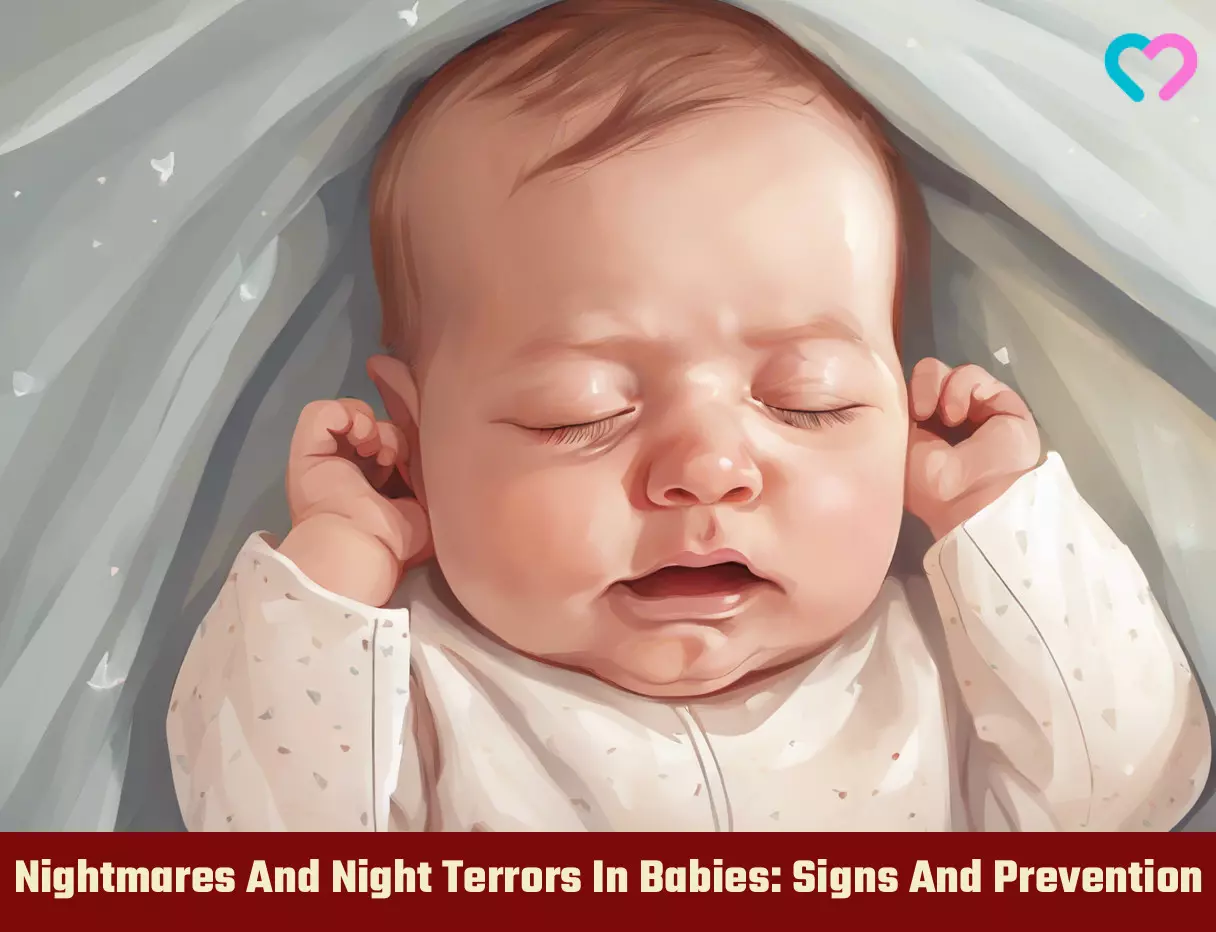
Image: Stable Diffusion/MomJunction Design Team
Learn to differentiate between a child’s nightmare and a night terror, the possible causes that might lead to it and ways to comfort your child after they have had either of them.
Personal Experience: Sources
MomJunction articles include first-hand experiences to provide you with better insights through real-life narratives. Here are the sources of personal accounts referenced in this article.
i. National Adoption Awareness Month Part 6 (sleep issues).
https://kenward.blogspot.com/2008/11/national-adoption-awareness-month-part_13.html
ii. Night Terrors.
https://freethinkingmoms.wordpress.com/2013/06/27/night-terrors/
References
- Why We Have Nightmares (And How to Prevent Them).
https://www.sleepfoundation.org/nightmares - Nightmares Night Terrors & Sleepwalking in Children: How Parents Can Help.
https://www.healthychildren.org/English/ages-stages/preschool/Pages/Nightmares-and-Night-Terrors.aspx - Nightmares.
https://kidshealth.org/en/parents/nightmare.html#:~:text=When%20kids%20wake%20up%20fromand%20can’t%20hurt%20them. - Newborn-Sleep Patterns.
https://www.chop.edu/pages/newborn-sleep-patterns - Nightmares and Night Terrors.
https://www.urmc.rochester.edu/encyclopedia/content.aspx?contenttypeid=90&contentid=P02257 - Nightmares.
https://kidshealth.org/en/parents/nightmare.html - Nightmares and the brain.
https://hms.harvard.edu/news-events/publications-archive/brain/nightmares-brain - Night terrors and nightmares.
https://www.nhs.uk/conditions/night-terrors/ - Nightmare disorder.
https://www.mayoclinic.org/diseases-conditions/nightmare-disorder/symptoms-causes/syc-20353515 - Do people really get nightmares from eating late?
https://www.health.harvard.edu/staying-healthy/do-people-really-get-nightmares-from-eating-late - Is Your Kid Having Nightmares? Who Has Them and How You Can Help.
https://health.clevelandclinic.org/nightmares-in-children - Nightmares and Night Terrors.
https://www.hopkinsmedicine.org/health/conditions-and-diseases/nightmares-and-night-terrors - Night Terrors.
https://my.clevelandclinic.org/health/diseases/night-terrors - Children Nightmares and Night Terrors.
https://ccy.jfcs.org/children-nightmares-and-night-terrors/ - Night Terrors: Causes and Tips for Prevention.
https://www.sleepfoundation.org/parasomnias/night-terrors - Night Terrors.
https://kidshealth.org/en/parents/terrors.html - Night Terrors.
https://www.ncbi.nlm.nih.gov/books/NBK493222/ - Sleep Terrors and Sleepwalking.
https://www.nationwidechildrens.org/conditions/sleep-terrors-and-sleepwalking - Sleep terrors (Night terrors).
https://www.mayoclinic.org/diseases-conditions/sleep-terrors/symptoms-causes/syc-20353524 - Nightmares and Night Terrors.
https://familydoctor.org/condition/nightmares-and-night-terrors/ - What You Should Know About Sleep Paralysis and ‘Sleep Demons.’
https://health.clevelandclinic.org/what-you-should-know-about-sleep-paralysis-and-sleep-demons - Night Terror.
https://www.sciencedirect.com/topics/psychology/night-terror - Nightmares and Night Terrors.
https://www.beaumont.org/services/childrens/health-safety/nightmares-night-terrors - Rosilia Silvestri and Edward Bromfield; (2004); Recurrent nightmares and disorders of arousal in temporal lobe epilepsy.
https://www.sciencedirect.com/science/article/abs/pii/S0361923004000887?via%3Dihub - J.F. Pagel and Carol Kwiatkowski; (2010); The Nighmares of sleep apnea: nightmare frequency declines with increasing apnea hypopnea index.
https://pubmed.ncbi.nlm.nih.gov/20191941/ - Alexander KC Leung et.al; (); Sleep Terrors: An Updated Review.
https://pmc.ncbi.nlm.nih.gov/articles/PMC8193803/ - Children’s nightmares and night terrors.
https://www2.hse.ie/babies-children/sleep/childrens-nightmares-and-night-terrors
Community Experiences
Join the conversation and become a part of our nurturing community! Share your stories, experiences, and insights to connect with fellow parents.
Read full bio of Jenni Johnson
Read full bio of Rohit Garoo
Read full bio of Swati Patwal
Read full bio of Vidya Tadapatri






 Quick fact
Quick fact
